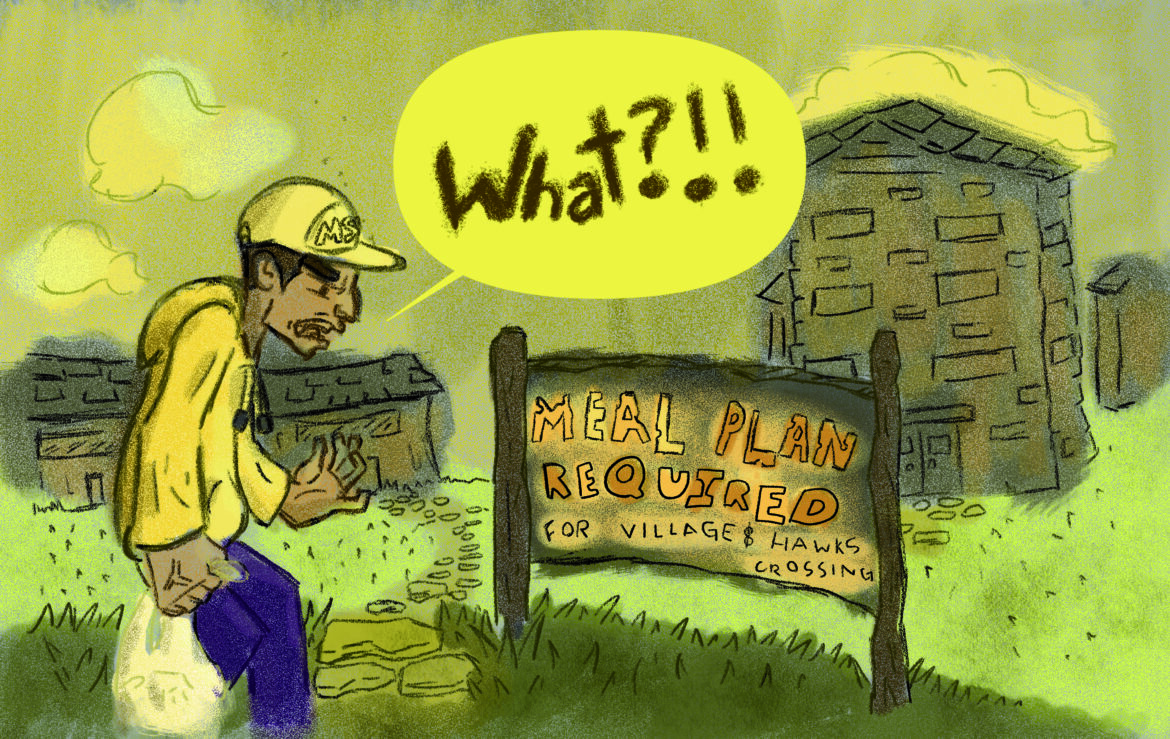In years past, residents in the apartments at Hawk Crossings and The Village were not required to pay for a meal plan, as each apartment has a kitchen. However, thanks to a decision made in the July 18 board of trustees meetings, this is no longer the case. Starting this year, all apartment residents must purchase a meal plan that is at least $250 per semester.
Mandatory dining deposits were sprung onto commuters last fall, a “refundable” amount which would cover on-campus venues if participants chose to use it. The keywords “if” and “participant” are used loosely, in the sense that the option to not enroll in the plan was nonexistent. In addition, many students faced difficulties in getting their refunds.
Having meal plans as an option for apartment is fine, or even creating an incentive to purchase a meal plan or flex dollars. But forcing students to have one is not the way to go.
The most obvious issue with the resident dining plan is the lack of freedom to prepare students’ own meals and the ability to use that money toward grocery shopping. The university offers a Shoppers’ Shuttle every week for that very reason.
Additionally, students were not given advance notice of this change before they selected their on-campus living arrangements. Students chose their housing for this academic year in late March, four months before this announcement was made. If students had known that this change was coming, they might have chosen to live in another residence, commute or live off campus.
However, what is probably the most concerning aspect of the plan, is the timing between the announcement and the fall bill’s deadline.
Apartment residents were notified of this change on July 30, the same day that the fall bill became available. The bill was due Aug. 12, just thirteen days later. Cutting the agreement this close gives students little time to reassess their housing agreement and contact the dining services to get it waived.
The message in the email sent in late July was simple; pay up for a meal plan you didn’t want, or you have a week to get out of your housing agreement. If the board of trustees doesn’t see how much that twists students’ arms, then it has failed to view this from our perspective.
Granted, the full-year $500 deposit is small compared to the full price tuition and board. At the same time, announcing the requirement so near the bill’s due date produces panic and comes across as a sly move.
If the food services want to be accessible and appealing, Montclair State University has the means to incentivize their options. However, the blatant regulation to force meal plans on residents of Hawk Crossings and The Village paints Montclair State as being hungry for students’ dollars.
If it were something akin to the commuter meal plan, where it would be refunded at the end of the semester, that may be more understandable. But as it stands, this is a cheap way to wring out a couple extra dimes from upperclassmen. And while this action may have some very well-protected language in the housing agreement, but however legal it may be, that does not stop it from being outright cowardly.
Even with good intentions, making the meal plan a last-minute addition so that students must accept it to avoid jeopardizing their housing is entirely unfair.
The simple truth is that such offerings should be optional, especially for upperclassmen. For many resident students, finally getting a spot in the campus apartments is seen as a luxury, a personal achievement for their hard work throughout their time at Montclair State. This new policy cheapens that feeling greatly. It gives the hard work a little less luster.
If the school does not want to undermine the time and dedication its students have put in, let us have our choices. Doing otherwise, as we have seen, is honestly in bad taste.



